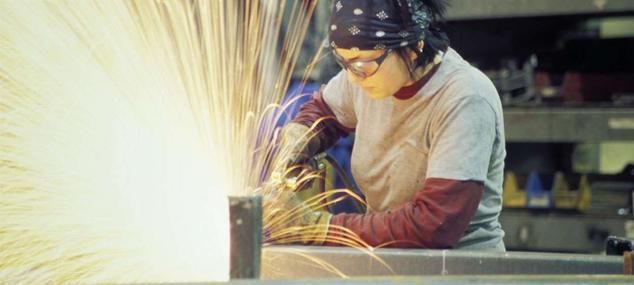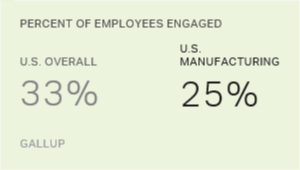Story Highlights
- Company missions don't play well in manufacturing settings
- Local mission motivates factory workers
- Ask workers what's important to them at the plant level
C-suites and strategy teams around the world spend a great deal of time on their company's mission statement. It's essential. It provides focus to employees and can redirect a company. Gallup's research indicates that mission is one of the key elements of employee engagement, and having a sense of purpose is crucial to individual well-being.
Unfortunately, my experience is that many companies -- especially those in manufacturing settings -- have difficulty motivating employees with their company mission statements. This experience is backed by Gallup research, which indicates that only slightly more than one-third of U.S. workers strongly agree that their company's mission or purpose makes them feel their job is important.
In manufacturing settings, it's an even greater struggle. The percentage of manufacturing and construction workers who strongly agree with that statement is 10 percentage points lower than U.S. workers overall. The percentage for manufacturing and construction workers is also lower than almost all other job types. That's a meaningful difference, but it's rare to see a meaningful solution.
Most manufacturing companies I encounter recognize that employees' lack of connection to the mission is an enormous untapped opportunity to drive their business forward. So they try to use different words and concepts to promote their mission among the workers in their plants. They put up posters on the shop floor that talk about pride in job roles or doing whatever it takes to succeed. They ask front-line supervisors to discuss mission with their workers, hoping that if managers try a little harder or do things a bit differently, their corporate mission will finally sink in and make employees feel a little prouder and work a little harder.
Yet mission numbers don't seem to move much in these plants, no matter what tactical or communication efforts leaders try to implement. As a result, I have talked with many leaders who think that factory workers just don't care about mission. I understand that feeling. But I can tell you from experience, it's not necessarily true.
Manufacturing workers can be inspired by mission, sometimes passionately so. But the mission that motivates them isn't necessarily what company leaders or communication teams plaster on the wall. And it is not necessarily the taglines recited by a spokesperson or on the corporate website. The problem is that most leaders think big, while most workers feel local.
Community Focus
After spending almost a decade consulting with manufacturing companies, I have found that workers can get behind missions that are important to the employees at that plant -- but the way in which the mission comes alive and is felt can vary from plant to plant. I've visited manufacturing facilities all over the world, and when my teams asked workers what truly matters to them, we get very grounded answers like these:
- "I want to be able to make a good living and take care of my family."
- "It's great that we contribute so much to the well-being of the local community. We affect a huge percentage of the people who live here, one way or another."
- "We donate quite a lot to the local food shelf -- that makes me feel good about working here. And I make sure people know it comes from my company."
- "You should see all the local sports teams we sponsor! And those kids -- and their parents -- really appreciate it."
- "If we closed, our town would wither."
- "We fought tooth and nail to make sure that when the company was looking to close one of its plants, it wouldn't be ours. We worked our tails off to make sure we were doing everything we could to be the most efficient. Turn out the best products. Make our customers happy."
Essentially, the mission that mattered the most to them was their ability to continue to exist and to have good-paying jobs -- and to apply what they do to create great things for their community.
I've seen this dynamic in plants all over the world, but it usually flies under the corporate radar. For example, a cereal manufacturing plant in North Carolina didn't have all of the biggest and best equipment, but its efficiency was better and its waste was lower than any other plant in the company. New products always seemed to run better there than at larger, more established facilities. The other plants attributed this success to the fact that the North Carolina site was newer, or that it had better mechanics, or the shifts were more flexible.
After meeting with the plant leaders and workers, I found that none of those things made a real difference. The reason the North Carolina plant ran better is because its workers were willing to do whatever it took to keep their plant up and running. Front-line employees recruited new hires, and "voted them off the island" if they didn't measure up. Every opportunity workers were given to step up, they answered, "Yes!" Their mission was to keep the plant alive. The mission they felt in their bones was to exist, and they believed they could control their own destiny. Other factories in nearby industries had shut their doors, and those workers had found themselves out of good jobs. That wasn't going to happen at their North Carolina plant.
Ask Factory Workers What's Important to Them
The idea that plants have a local mission may seem counterintuitive. A corporate mission, after all, is supposed to unify every member of an organization and point them in a specific direction. Mission gives employees something bigger and more important to believe in and work for, and it helps employees connect what they do every day to the local teams, plant and community in which they work. I've seen that shared feeling of purpose and it engages workers and spurs them to do more, to drive for success, and to push themselves to get better.
I saw this dynamic play out at a corrugated packaging plant in Texas. The packaging industry is particularly competitive, and it's hard to innovate because the technology, machinery and work are essentially the same from plant to plant. But the factory in Texas hums along much better than the others in the company. Employees show up for their shifts. The equipment stays on line because the operators know just the right way to tweak the equipment. Loads are stacked straighter and don't shift.
The Texas plant doesn't have the newest or the best or the most of many things that employees may wish for. Just-in-time deliveries wreak havoc on workers' schedules, as they do at every other packaging plant. But managers at this plant encourage their workers to have pride in themselves and feel ownership of their site. As a result, the Texas plant runs better, has more repeat customers, takes last-minute jobs and gets them done with flair.
I could list similar examples from plants around the world. The companies may be different; some plants have unions and some don't, some are producing in healthy economies and some aren't. But all these plants have two mission statements: the official corporate mission and the unwritten local one. Both missions are important, but the local one inspires real passion.
Ultimately, leaders must recognize that the mission that matters most to factory workers is the local one. Let that mission be about whatever is most important to the people who work there. You'll find it's almost always about keeping the doors open and the community healthy.
My recommendation to C-suites and corporate strategists is to ask plant workers what's important to them: What does it take to operate in their location? What does the plant mean to the local community? What would be lost if it went away? Talk about those questions -- and the answers -- on the floor, and invite every worker to respond. Listen carefully to what they say, and encourage the plants to craft their local missions.
But don't stop there. Ask workers to imagine that there is a threat to the plant's existence. What would they do to keep the plant alive? What could they do to keep the doors open and deliver on their local mission? Talk it over. Then start doing those things -- now.

